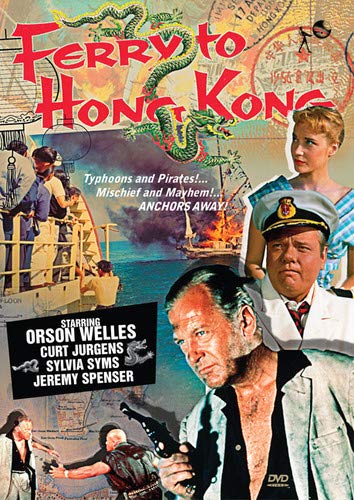
Just one year after the disastrous debut of Orson Welles’ Touch of Evil in 1958, the mighty auteur found himself in Ferry to Hong Kong, a low-budget British production set and filmed in the Orient. Co-written and directed by Lewis Gilbert, who later went on to helm the James Bond movies You Only Live Twice, The Spy Who Loved Me, and Moonraker. Reminding me of the finale of The Three Stooges short Dizzy Pilots, wherein Moe Howard was covered in rubber and accidentally turned into a human balloon, Welles (complete with a ridiculous English accent) overdoes it to no end as he waltzes around as the proprietor of a ferry.
Captain Hart (Welles) runs what he likes to call a respectable operation, transporting people from Hong Kong to Macau and back again on a daily basis. His image is threatened, however, once the HK authorities decide to deport a fellow by the name o’ Mark Bertram Conrad (Curd Jürgens, in one of his few good guy roles, and who would also reunite with director Gilbert on The Spy Who Loved Me as the bad guy). Conrad’s a guy with a passion for drinking and getting into trouble — something that doesn’t bode well with Hart. Nevertheless, the captain agrees to transport the deportee to Macau, assuming he’ll be rid of him after the voyage is over.
Well, as it turns out, Fate is in a playful mood: Conrad is refused entry to Macau by the local government, and cannot return to Hong Kong, so he is forced to live on the deck of the ferry. Although Conrad makes friends with the crew — as well becoming the object of desire for a young teacher named Liz (Sylvia Sims) — Capt. Hart can’t stand him, and the two are at each other’s throats constantly. Things change, though, after an accident on the sea takes place, which is followed by a rough storm, and the ship is left in dire straits; it’s entire crew and passengers vulnerable to a gang of murderous pirates led by one of Conrad’s nefarious pals, Johnny Sing-Up (Roy Chiao, Golden Needles, Indiana Jones and the Temple of Doom).
There’s little doubt as to who the real star is here: Jürgens. Welles’ on the other hand is morbidly fascinating to watch as he plays the part like a British Oliver Hardy, and a comical moment with him readying to down a bottle of bubbly only eerily foreshadows his later career (Paul Masson commercials, anyone?). Also starring in this offbeat and oft-wacky tale are Jeremy Spencer (who popped up in an episode of the TV version of Welles’ immortal The Third Man in 1960), Noel Purcell (a regular face in Dirk Bogarde’s Doctor series) as the ship’s engineer with a wife and five children on both sides of the sea, and Milton Reid (who also showed up in The Spy Who Loved Me!) as Chiao’s sadistic “business” partner.
VCI Entertainment brings us the probably-not-very-awaited DVD debut of Ferry to Hong Kong in a non-anamorphic widescreen aspect ratio (yes, that’s right: non-anamorphic — boo!) with a Dolby Digital 2.0 soundtrack. Most of the actors appear to have rerecorded most of their dialogue; Welles’ voice in particular was obviously looped, evident in scenes of him slurring away perfectly with a cigar in his mouth. There are no special features to be found here, though the title itself is a bit of a treat — as, not only do we get to see the great Curd Jürgens portray a good guy for a change (albeit an alcoholic one), we also get to see the beginning of the end of Orson Welles’ career.
And the movie itself isn’t that bad, either. Not great, but not bad. Think “mid-afternoon fare” and you’ve just about got it.